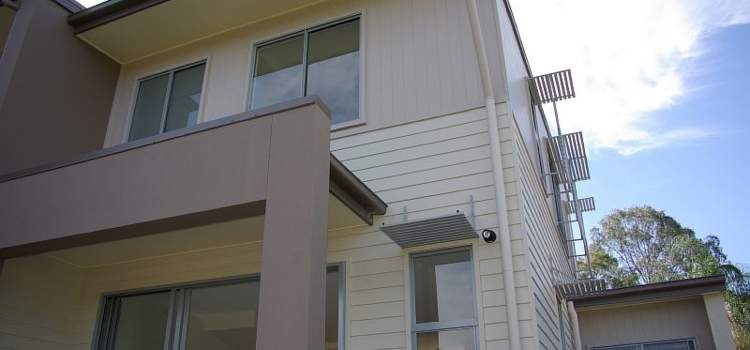In recent years there has been a wave of projects commonly marketed as “freehold townhomes” or “freehold townhouses” around Brisbane.
For many this can be confusing as the majority of us are conditioned that typically any form of unit or townhouse is strata titled through a building format plan. In these circumstances there is a Body Corporate and annual levies to be paid along with a range of rules. For developers and purchasers the presence of a Body Corporate can be a negative due to the ongoing costs associated with it.
In the Brisbane City Council area a townhome is classified as a Dual Occupancy or a Multiple Dwelling, which is the same as a townhouse.
Many people wonder how these homes can be freehold, particularly when the dwellings are attached, usually through a party wall.
There is a little known provision in the City Plan 2014 that enables Council to support “subdivision of existing or approved buildings“.
There is a good explanation of the difference between strata title and subdivision on our website.
Under the City Plan, Council generally will support subdivision below the usual minimum lot size where they have already approved the built form for the development. However minimum lot sizes will typically be enforced where vacant lots are being created and the development outcome is unknown.
Subdivision of existing or approved buildings allows for each dwelling to be located on their own standard format plan (“freehold”) allotment. In some cases common areas such as shared accessways may need to be covered by easements. In other cases these may form common property with access areas only being subject to a Body Corporate, a kind of hybrid scenario.
The main advantages to freehold title for this housing type is the avoidance of body corporate and its associated ongoing contributions and fees. This makes it more attractive to potential purchasers who might otherwise not consider this housing type.
Lack of clarity on the dwelling type means you could find yourself in a situation where you think you can undertake alterations like you would to a house, only to find that it is a Dual Occupancy or Multiple Dwelling and that those changes are not possible. Unfortunately we have seen this happen.
However there are some things to watch out for if you are considering a townhome or townhouse with a freehold title. The first is what type of dwelling it actually is. Just because something is marketed as a townhome/townhouse doesn’t mean that is its dwelling type.
Since all registered or title plans became standardised and known as Survey Plans (SP) it is no longer obvious to a lot of people, even experts in the property industry, as to what type of development a dwelling is.
Previously strata titled development was on a Building Unit Plan (BUP); Group or Community Title Development was on a Group Title Plan (GTP); and freehold or Standard Format Plan development was on a Registered Plan (RP).
Doing a title search on a lot showing an SP will only identify easements, the presence of a Body Corporate and other encumbrances, it won’t confirm whether the property is a dwelling house, dual occupancy or multiple dwelling.
However there may be some visual clues that it isn’t a dwelling house, including:
- whether it is attached
- it is on a very small lot
- it is located at the rear of other dwellings.
Another potential negative of freehold in this situation is any shared spaces, like access driveways. In time these will require maintenance or replacement and with no Body Corporate in place there will be no sinking fund to cover these expenses. Owners benefitting from this access may not be able to afford or reach agreement on the costs of making timely repairs.
So is a freehold townhome a good idea? That comes down to personal preference and understanding the broader implications it will have on your life in the property. Developers also need to think beyond marketing when it comes to titling their development and how that will play out based on the access and design of the project.
Consult Planning are experts in these matters and often assist in undertaking due diligence for potential property acquisitions and also for developers in relation to development feasibility. For specific advice regarding these matters send us an email to office@consultplanning.com.au or call us on 1300 017 540.
Disclaimer: While every effort has been made to provide accurate information, Consult Planning does not guarantee that this blog article is free from errors or omissions or is suitable for your intended use. Requirements and standards frequently change so every individual proposal should be thoroughly investigated.








